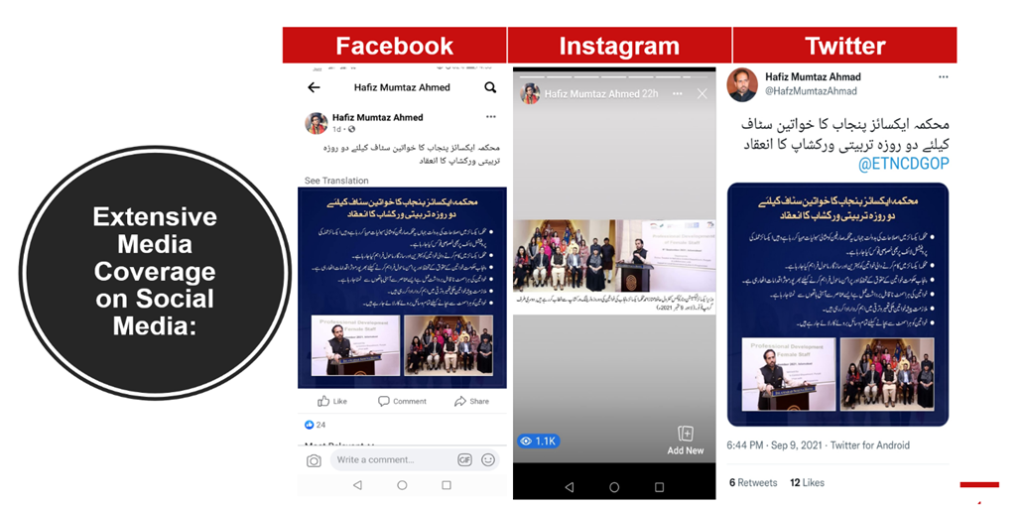Gender inequality in Pakistan is deeply rooted in its social and economic systems. According to the ‘Global Gender Gap Report 2021’ published by the World Economic Forum (WEF), Pakistan ranked 153rd out of 156 countries on the gender parity index. GIZ, is implementing the “Support to Local Governance Programme (LoGo-II)” which supports partners in inclusive service delivery and domestic revenue. Excise, Taxation & Narcotics Control Department (ET&NCD), Punjab is one of its major counterparts which collects various taxes and duties in order to mobilize resources in the Province. Unfortunately, the organizational structure of the ET&NCD is dominated by males with more than 95% male staff and only 5% female staff. The need of female staff for professional development has not received adequate priority by the Excise Department in the past. Therefore, GIZ in collaboration with the senior management of ET&NCD designed and conducted five training sessions specifically for the professional development of female staff of ET&NCD.
We in GIZ give special importance to gender empowerment and believe that the true meaning of gender equality is in giving equal opportunity to females, also in the context of training prospects.
Training on Workplace Harassment Policies & Stress Management:
- Professional development training was designed specifically for the female staff (female inspectors) to comprehend their understanding on workplace harassment policies and stress management techniques.
- The theme of the training was gender inclusion through empowering and educating females of their rights at workplace.
- Five training programmes were conducted in September and October 2021 exclusively for female staff of the Excise department wherein more than 50 female officers were trained.
- The first session on ‘Stress Management Techniques’ was conducted by an experienced Clinical Psychologist. Different aspects on awareness and daily life management were discussed on how to incorporate work-life-balance approach & mitigate stress through its’ effective management.
- The second session was on ‘Harassment at Workplace’; Awareness, Prevention and its Management. It was a very interactive and participatory discussion with participants sharing their real-time citations.
- In the last session, the cohort of female Excise staff was focused on the legal and institutional recourse available to them in the event of harassment. A senior legal advisor from Punjab Commission on the Status of Women explained the legal rights available to females under the general Law & Harassment Act.
- Minister for Excise & Taxation graced one of these occasions as the guest of honor. He appreciated the GIZ’s initiative and acknowledged the need of gender equality and gender inclusive approach in the Department.
Impact of this Measure:
Following are the long-lasting impacts and outcomes of these trainings:
- Contributed to SDG-5 and SDG-10 of Agenda 2030.
- Gender Mainstreaming through Gender Inclusion & Empowerment.
- Overwhelming feedback from female officers.
- Capacity Building of Female Excise Staff.
- Boosting Tax Revenues.
- Improved Tax Administration.
- Better Service Delivery.
- Improved quality of HR through professional development.
Media Coverage:
Since the female-centric trainings happened for the first time in the history of Excise Department Punjab, it attracted extensive and prominent media coverage in all three mediums; in print media through 21 leading dailies of Pakistan, eminent electronic media coverage in renowned TV channels and social media coverage though Facebook, Instagram and twitter, thus contributed to the positive image-building of the male-dominant organization through gender inclusion and empowerment and making this intervention a tremendous success 😊 .



Platform for Equal Access to Females:
This measure serves as an excellent platform for gender inclusion through gender empowerment and providing equal access to females in professional environment. These training programmes are a great learning opportunity for the female staff and the written response from them is overwhelming. They shared the usefulness of these sessions in empowering them and enhancing their capacities to deal with their work-related issues and exercising their rights at workplaces. This intervention also helped in raising the revenue collections of the Department through improved quality of HR by professional development of female officers thus resulting in better service delivery to the citizens. This initiative further contributes to gender equality and the elimination of existing gender-specific disadvantages and discrimination in the Department.





